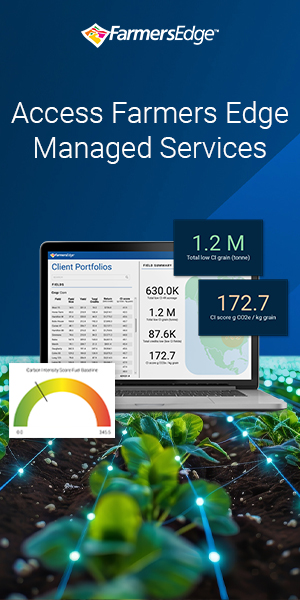Introduction and Project Background
A leading Canadian renewable fuel provider was looking for innovative solutions to meet the challenges of Canada’s Clean Fuel Regulations (CFR). These regulations require fossil fuel producers and sellers to progressively reduce the carbon intensity (CI) of their operations and products. Given the scale of their footprint, this was a massive undertaking for the company. The company partnered with Farmers Edge to pilot a field-based CI scoring initiative, exploring how agricultural data could play a pivotal role in achieving their goals.
The Challenge
Canada’s CFR mandates a decreasing reliance on fossil fuels by blending renewable alternatives like ethanol and biodiesel. Measurement, however, was a challenge because the CI score traditionally used for crops was a single average figure that didn’t account for the variety of sustainability practices in place across different farms. Our client knew they could improve the accuracy of CI scores if they could somehow harness and leverage farm-level data. But they didn’t have the infrastructure to gather and analyze the right data effectively.
Harnessing farm-level data depended on the company’s ability to get reliable and regular data from farmers. That meant finding a solution that could integrate seamlessly with their existing farm practices and not create layers of complexity. Scaling this initiative would be a challenge because it relied heavily on data from people who lacked the tools and motivation to provide it.
Developing a proof of concept to demonstrate the feasibility of field-based CI scoring to Canadian regulators depended on robust data sets. Our client needed a partner who knew how to develop a dependable solution tailored to their specific problem. This included robust datasets and proof of concept to engage Canadian regulators and demonstrate the feasibility and impact of incorporating field-based CI scoring into CFR compliance efforts.
The Solution
This leading renewable fuel provider chose to partner with Farmers Edge to pilot CI scoring with farmers in Ontario. Together, we were able to collect data from a pool of 16 participants, farming over 9,000 acres of corn across the province. These farmers provided detailed information on their cornfields, which was processed using OpenLCA, Canada’s lifecycle analysis tool. This solution enabled precise CI calculations based on specific farm practices.
By leveraging the comprehensive digital Farmers Edge FarmCommand® platform, we were able to ensure that only our client and regulators had access to sensitive information. Our approach built trust among the farmers who participated and streamlined the process of integrating agricultural data into the CI scoring methodology.
In addition to facilitating the collection and analysis of the data, Farmers Edge worked alongside our client company to present findings to Canadian regulators, highlighting how advanced tools like ours empower farmers to contribute to CFR goals. Our joint advocacy efforts emphasized that while not all farmers are ready to adopt these methods, a significant portion of high-production growers are equipped to drive meaningful change.
This first-of-its-kind pilot demonstrated that farm-level CI scoring could significantly enhance the carbon intensity calculations for renewable fuel plants, providing clarity on what’s achievable and setting the stage for future scalability.
Fertilizer field emissions and upstream fertilizer manufacturing emissions accounted for 77% of the CI score on average. Our Variable Rate Nitrogen service impacts this directly by ensuring the nitrogen gets into the crop instead of the environment.
Outcomes
Upon the conclusion of the pilot program, our client had a comprehensive understanding of how field-based CI scoring could be leveraged to have a significant impact on their operations. They now have a basis to incorporate these methodologies into their long-term strategies should regulations formalize their use in agriculture. This collaboration underscored the importance of agricultural data in achieving CFR goals and demonstrated the feasibility of scaling these efforts across Canada.
Conclusion
Through a collaborative pilot project, we helped our renewable fuel client navigate the complexities of field-based CI scoring, aligning their agricultural initiatives with the demands of Canada’s Clean Fuel Regulations. By leveraging advanced tools, engaging farmers, and advocating with regulators, we laid the groundwork for scalable, impactful solutions that bridge agriculture and energy. Together, we’re poised to drive sustainability in Canada’s renewable fuel production and beyond.

